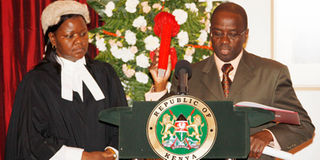New Mutunga tax move isolates MPs

Photo/PPS
Dr Willy Mutunga is sworn in as the new Chief Justice at State House, Nairobi on June 20, 2011. Looking on is High Court Registrar Lydia Achode (left). The Chief Justice has asked the taxman to compute taxes owed by Judges.
Judges have bowed to pressure and agreed to pay taxes, leaving MPs isolated in their opposition to the move.
Chief Justice Willy Mutunga who is not affected by the demand for back taxes by the Kenya Revenue Authority (KRA) has asked the taxman to compute the amounts owed by judges.
Yesterday, Commissioner of Domestic Taxes John Njiraini and other KRA officials met Chief Justice Mutunga and High Court registrar Lydia Achode.
The meeting at the Chief Justice’s offices is understood to have been called after Dr Mutunga asked the taxman what the Judiciary needed to do to comply with the tax requirements.
The overture was made two days after the Chief Justice was sworn in and effectively puts Dr Mutunga at the centre of the debate on tax payment by offices previously exempted by the old constitution.
It is understood that the Chief Justice believes that no Kenyan should be exempt from taxation.
Judges are among public officials the taxpayer wants to draw into the tax net and it is understood they have opted for discussions with the KRA instead of the confrontational approach preferred by MPs, who have vowed not to pay up.
Like MPs, judges have also been anxious over the taxman’s announcement this week that they are expected to pay tax on their allowances backdated to August 27 last year, the date of the Constitution’s promulgation.
Mr Njiraini told Saturday Nation that it was rare for taxpayers to contact KRA on how and when they can start remitting the monthly dues.
“What I can confirm is that the Judiciary has contacted us and it is ready to pay. I encourage the other institution we have written to follow suit,” he said earlier.
The taxman knows exactly what that kind of a call can unleash, especially because of the history KRA has had with MPs and other holders of constitutional offices.
KRA has twice attempted and failed to have MPs pay tax. And in both attempts, the efforts were thwarted by court rulings because the old Constitution allowed the exemptions.
That is why the President, MPs, commissioners and judges have enjoyed tax exemptions.
But this is no longer the case as the new constitution clearly states in Article 210(3) that “No law may exclude or authorise the exclusion of a State officer from payment of tax.”
The Constitution Implementation Commission has interpreted it exactly that way: nobody, and CIC chairman Charles Nyachae emphasises, nobody is exempted.
Mr Njiraini could, with a sigh of relief, refer any aggrieved party to the Supreme Court for interpretation. He knows what that means.
“I appeal to the MPs and any party that thinks we are not following the law to refer that matter to the Supreme Court,” Mr Njiraini is on record saying.
Kinangop MP David Ngugi said MPs would take the matter to the Supreme Court once its judges are sworn in.
Mr Ngugi accused the Government through the Kenya Revenue Authority of violating the rights of MPs by seeking to impose tax on their allowances mid-stream.
Highest court
“We will go to this highest court, not for interpretation of the law, but to present our case because our human rights have been violated by those who want to vary our contract illegally,’’ said the Kinangop MP.
Mr Njiraini said previous attempts in 2007 and 2009 to force MPs to join the rest of Kenyans in paying taxes failed due to the old constitutional order which the lawmakers could easily manipulate to their advantage.
“Previously, our hands were tied by the law, but now anything that is contrary to the constitution is null and void. The law is on our side,’’ Mr Njiraini said.
Mr Njiraini has said the revenue collector will not hesitate to seize MPs’ property or attach their salaries as it once did with Justice minister Mutula Kilonzo.
The Constitution explicitly provides that no public official will be exempted from paying taxes. From the moment it became law on August 27 last year, the incomes of constitutional office holders became taxable.
KRA has given the affected officials and their employers until mid-July to pay up.
On its part, the Parliamentary Service Commission (PSC) — the administrative wing of the House — has thrown its weight behind the MPs, saying they will not pay tax until the law is reviewed.
Mr Walter Nyambati, the vice-chairman of the PSC and MPs Olago Aluoch and Jamleck Kamau, both members of the commission, accused the taxman of malice and mischief by publicly demanding that they pay up.
Meanwhile, the office of Finance Minister Uhuru Kenyatta has told MPs accusing him of instigating the taxation measure to stop dragging Treasury into the issue, saying the KRA was an independent department.
The deputy Prime Minister’s spokesman Mr Munyori Buku recalled that only recently, Treasury differed with the Constitution Implementation Commission over interpretation of the law over presentation of the annual Budget.
“How then can Treasury be said to be behind this? Let people and leaders in particular begin to understand what it means to have independent commissions.
This is now the era of true separation of powers and those who fight the Constitution when it befits them and want to blame others when it does not had better shape up or ship out,’’ said Mr Buku.




